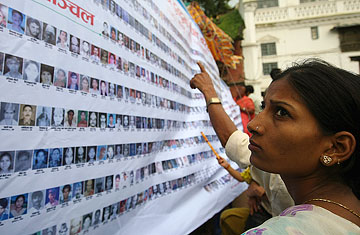Pursuit of peace and justice still a far cry (Commentary)

File Photo
Krishna Sapkota / Kathmandu: ‘It was nearly two decades ago on February 1, 1997 that my father was brutally tortured and hacked to death when he was bound to Rolpa district headquarters Liwang from Uwa. The then rebels arbitrarily took him out from a house where he was taking shelter and left him beheaded in the nearby paddy field’, recounted Shree Kumari Roka, a local of Rolpa – the epicenter of the decade-long armed conflict of Nepal that ended in November 2006.
However, as of June 9, Roka’s family had not lodged any complaint at the Truth and Reconciliation Commission (TRC) – the transitional justice mechanism formed to find out the truth about incidents of gross violation of human rights in the course of armed conflict and provide recommendation for legal actions.
“We do not trust that the murderers of our father – Ramji Gharti Magar – who are roaming scot-free in the society will ever be booked and we will get justice. Nobody else can sense our painstaking moments when my brother was abducted and my mother along with three children were forced to leave home for the district headquarters after my father’s murder”, she narrated with her throat obstructed.
The situation was so harrowing after the state side also resorted to indiscriminately action, killing eight members of a family in Ghorahi-3, Barghadi in late 2001 in retaliation to the Maoist attack on the Nepal Army barracks in the district headquarters, said Chairperson of Family Planning Association of Nepal Dang Chapter Nirmala GautamRegmi, who is also a conflict survivor.
“There was horror from both sides and the innocent people were subjected to become victims to both”, she added, arguing that the State could not dispense justice and restore peace in a true sense undermining the sensitivities of the victims.
These are just few examples of thousands of incidents of serious human rights violation that took place across the country during the ten years of armed conflict in the country, and which is expected to be probed and prodded by the Truth and Reconciliation Commission and Commission for Investigation on Enforced Disappeared Persons.
“The conflict had discernible impact on our society. But we have not shown honesty to seriously study the multiple consequences of the war”, noted Prof Birendra Prasad Mishra, the Author of a Book ‘Nepalese Peace Process’. Prof Mishra said Nepal’s peace process that had embarked on after signing the Comprehensive Peace Accord (CPA) between the State and then CPN-Maoist put the utmost focus to bringing the rebel force into the peace process but kept the concerns of war victims at bay.
Prof Mishra said this while addressing the mid-western regional conference ‘Peace Process in Nepal: Reflections and Way Forward’ organized by the European Union (EU) and USAID in partnership with Government of Nepal at Dang headquarters, Ghorahi, on June 9 in commemoration of a decade of signing of the CPA. “The political parties have been digressed from pursuing the main agenda of the implementation of the constitution– an integral part of the peace process. Though the transitional mechanisms are receiving complaints from victims but the implementation is still uncertain”.
Also speaking at the programme, Minister for Peace and Reconstruction Eknath Dhakal however expressed government’s commitment to implement the recommendations of the reports of commissions to logically conclude the ongoing home-grown peace process of Nepal. “The preliminary investigation into the war-era cases has already started adopting the principle of transitional justice and the execution of their recommendations will conclude the chapter of peace process and open up avenue for the country’s transformation”, Minister Dhakal said.
Promulgation of the new constitution is the testimony to the fact that the country is moving towards completing the peace process and democratic transitioning. Ranjee Teerink, Ambassador of Delegation of the European Union that has supported the implementation of the CPA and Nepal’s peace process, said “Nepal has made some commendable achievements in the first decade while implementing the CPA.
Among them are management of arms and armies of then CPN-Maoist, promulgation of a new constitution through the Constituent Assembly, formation of the transitional justice commissions, promotion of inclusive policies and programmes and reconstruction of some crucial infrastructures”.
Delivering his articulations on ‘Way Forward of Nepal’s Peace Process’, another speaker Prof Krishna Khanal said the signing of CPA had paved a win-win situation of the actors of the peace process while stressing the need to go for reconciliation rather than punishment to conclude the hard-earned achievements.
“We perceived the commissions in a different way but the future course should be reconciliation between the perpetrators and victims for lasting peace. Reconciliation in a broader sense is a way of confession and correction of crimes and an opportunity to remove our fear so that it would resist future generation from involving in such armed insurgency and bring the society to the peaceful fold”, he asserted.
However, the reconciliation should be done understating the perspectives of truth and impunity, Prof Khanal argued.
The year 2016 marks the first decade of Nepal’s peace process. Learning from the decade-long experience, it is high time that Nepal concludes the peace process by ending prolonged transition in a way to keep our social harmony intact, ensuring that the roots of the conflict are addressed and the country is guided to the pathway towards much-needed economic prosperity.
Dispensing justice to conflict survivors and meticulous reconciliation seems to be the way forward for sustainable peace, which is likely to be a long march ahead. RSS
